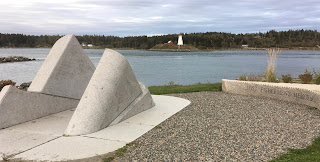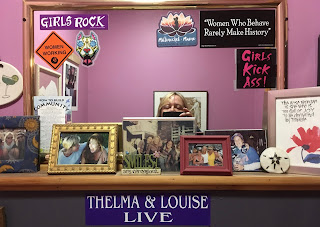 I am in the midst of this undeniable privilege: traveling to explore other places and communities in this world. For a week of rest and relaxation and learning, Judith and I chose an island further down east from our home in Deer Isle, ME, and journeyed to Prince Edward Island.
I am in the midst of this undeniable privilege: traveling to explore other places and communities in this world. For a week of rest and relaxation and learning, Judith and I chose an island further down east from our home in Deer Isle, ME, and journeyed to Prince Edward Island. PEI is an island community home to approximately 135,000 souls and, like Deer Isle, hosts a robust fishing community -- although theirs is both more regulated AND more supported by the Canadian government, making Canadian lobster the primary competitor to our Maine crustracean. Additionally, there appears to be a somewhat robust bluefin tuna fishery here at this time of year, complementing the potato harvest. The red soil and long beaches make this a beautiful place, and we pass by field after field of potatoes newly harvested and awaiting the wheat, oats, and barley that will come next. The potatoes love the red, iron-rich soil and Irish Cobblers and other potato varieties are much beloved. With the decidedly Celtic lilt in the people's voices, it is easy to imagine a time when no ocean divided Ireland, Scotland, and Canada's Maritime Provinces.
PEI is an island community home to approximately 135,000 souls and, like Deer Isle, hosts a robust fishing community -- although theirs is both more regulated AND more supported by the Canadian government, making Canadian lobster the primary competitor to our Maine crustracean. Additionally, there appears to be a somewhat robust bluefin tuna fishery here at this time of year, complementing the potato harvest. The red soil and long beaches make this a beautiful place, and we pass by field after field of potatoes newly harvested and awaiting the wheat, oats, and barley that will come next. The potatoes love the red, iron-rich soil and Irish Cobblers and other potato varieties are much beloved. With the decidedly Celtic lilt in the people's voices, it is easy to imagine a time when no ocean divided Ireland, Scotland, and Canada's Maritime Provinces.Yet all over, too, we see how the economic consolidation of agriculture -- where once a 75-acre farm could support a family, now potatoes are grown on 1600-acre farms, just as in the U.S. midwest -- is creating gaps and shifts in the traditional island ways. Potato fields are given over everywhere to tourist cottages and second homes. And the Canadian government, either sensing or responding to these shifts or both, is a huge supporter of cultural tourism; which on PEI means Anne of Green Gables.
The beloved book by the native PEI author has an entire tourism trail named for its various locations, complete with actors dressed as Anne and a huge visitor center hosting bus loads of international tourists at the House of Green Gables. It's quite astounding.
As we drive, however, it is difficult not to wonder: are we merely visiting this earth, or living on it? As we have allowed our economies to develop uncontrolled, they at times appear to be eating us up rather than serving us. The truth is, the way native peoples once lived sustainably on our shores for thousands of years was never the colonial plan. British colonists in particular were in service to an empire on which "the sun never set" and from the time they set foot on these shores created economies that were about exports: exporting livestock (and enslaved peoples) and timber to the British colonies, in the West Indies or England; importing the rum and sugar and other goods they then needed to survive on their own. Colonization is about acquisition and consumption and the white narrative of North America is defined by this.
 |
| The House of Green Gables. |


















